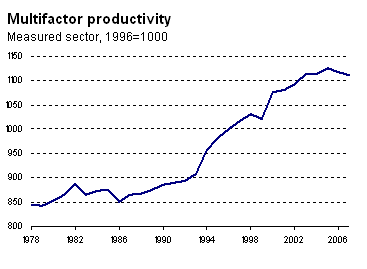Less aspiration, more perspiration
Economics is the study of changes at the margin. It is thus apt that the economic policies being proposed by the two main parties feature, at most, marginal changes. But endorsing the status quo sits awkwardly with their aspirational goals.
I submit two stylised facts about New Zealand’s current economic framework:
- Policies are generally of high quality by international standards.
- The policy framework has failed to produce the acceleration in productivity growth required if we are to shift our living standards into the top half of OECD countries.
The first of these facts explains why there is little daylight between the economic policies of the two main parties – with solid policy fundamentals, most changes at this stage tend to be incremental. The more radical changes proposed by the fringe parties tend to be retrograde steps.
Unfortunately, the second of these facts makes a mockery of the lofty economic goals adhered to by Labour and National. The recorded economic performance of the last 15 years (the post-reform expansion) strongly argues against the idea that we are poised to climb up the OECD ladder.
The graph shows multifactor productivity growth, the purest gauge of the economy’s efficiency. The steady progress since 1993 is apparent. But at an annualised rate of 1.4%pa, we are barely doing enough to hold our position in the OECD, and recent results suggest that that we are struggling to even maintain that pace.

We can thank the policy environment of the last 20 years for arresting our relative slide. However, it is a harsh reality that sound economic policies are necessary but not sufficient for climbing the OECD ladder. For either political party to repeat that goal suggests incomprehension of one of the two facts stated earlier. Labour is in denial of the fact that its economic record in office has been unremarkable despite implementing (what it considers are) wholesale changes from the "failed policies of the 1990s". National is in denial that the scope for growth gains from tweaking already sound policy settings is miniscule.
Both parties have been committed to the basic economic policy foundation for some time. Independent monetary policy has reduced inflation and led to more muted economic cycles. Lightly (but effectively) regulated labour markets have contributed to a low unemployment rate, along with steady real wage growth and a minimum of industrial disputes.
Commitment to balanced budgets and transparent fiscal accounts leaves the government accounts in a healthy position (present deficits should not be a concern in light of the long-run outlook). At the nuts and bolts level it is easy to start and run a business, and our institutions are free of corruption.
Outside of this, there is little that governments can do at the macro level – we should not be surprised that it is hard to discern the impact of supposedly very different economic policies in the productivity data.
Despite the rush to "do something" in the face of the current crisis, governments now have very little influence on the economy in the old-fashioned, Keynesian sense. The point of independent monetary policy is to effectively cede the government’s ability to influence the economy over the short-term (government attempts to create fiscal stimulus or contraction will be unwound by the Reserve Bank if inconsistent with the inflation target).
People themselves do the best to mitigate the impact of policies that don’t accord with personal preferences. The government’s attempts to raise the savings rate through higher taxes and budget surpluses have been more than offset by New Zealanders borrowing from overseas.
What is left for government? Governments remain crucially important for building solid institutions, and constructing effective decision-making processes. Ultimately, the best opportunity for the government to stamp its authority on the economy comes through efficient management of the one-third of activity concentrated in the public sector.
Unfortunately, the technocratic job of building robust decision-making processes doesn’t win elections. Throwing the process to the wayside does. National’s populist intention to over-rule the investment advice of the Super Fund guardians springs to mind. Labour’s fiddling with the Reserve Bank Act is another egregious example that bears some of the blame for current inflationary problems.
The genesis of independent monetary policy was the belief that governments can’t be trusted with short-term economic decisions. Institutions are required, in part, to hold in check the worst election-year instincts of political parties.
In the same vein, we need more checks against grand meaningless goals. A good starting point is scaling back our aims and introducing real accountability.
Labour’s economic policy has provided a glaring example of how not to do this. Labour aims to raise exports to 40% of GDP by 2020. However, over the 2000-2008 period, exports fell from 30.6% of GDP to 28.9%. This fall was despite the strong improvement in the terms of trade, and Labour’s attempts to facilitate more hands-on economic development through NZTE and MED. Ridiculously overreaching goals, offering nothing in the way of genuine methods for progressing towards those goals, invite a repeat of that failure.
The sooner our would-be economic saviours resigned themselves to the limits of the government’s capacity to improve economic performance, the quicker the focus could turn to the smaller and more specific policy arenas where gains can realistically be achieved.




